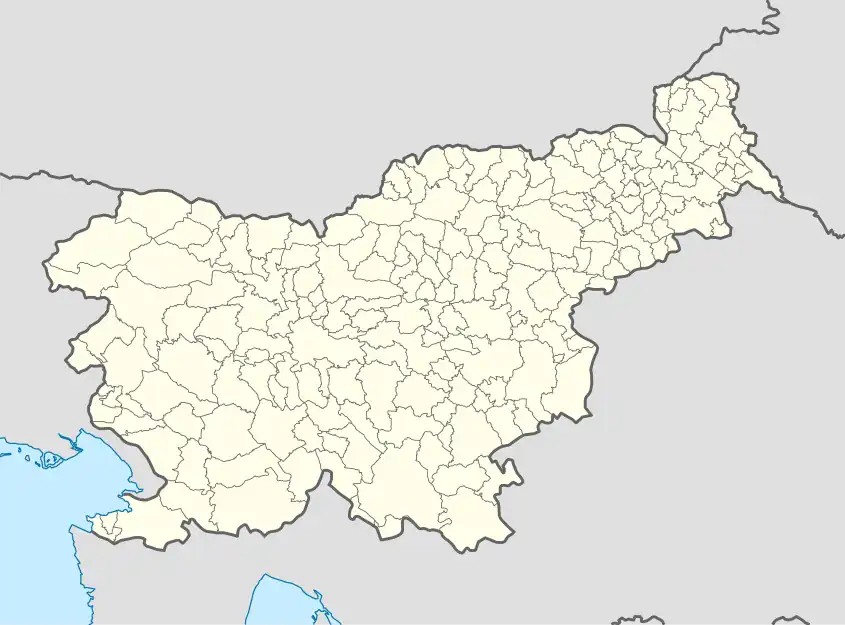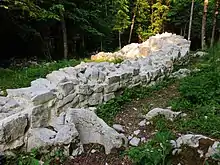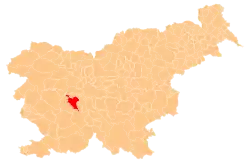Strmica | |
|---|---|
 | |
 Strmica Location in Slovenia | |
| Coordinates: 45°57′6.42″N 14°16′12.86″E / 45.9517833°N 14.2702389°E | |
| Country | |
| Traditional region | Inner Carniola |
| Statistical region | Central Slovenia |
| Municipality | Vrhnika |
| Area | |
| • Total | 2.68 km2 (1.03 sq mi) |
| Elevation | 483.3 m (1,585.6 ft) |
| [1] | |
Strmica (pronounced [ˈstəɾmitsa]) is a small settlement in the hills west of Vrhnika in the Inner Carniola region of Slovenia.[2]
Name
The name Strmica was originally an oronym referring to Strmica Hill (626 m) southwest of the settlement. It probably originally had the form *Strьma(ja) gora (literally, 'steep mountain') and was later univerbized to Strmica (literally, 'the steep one').[3]
Mass grave

Strmica is the site of a mass grave from the period immediately after the Second World War. The Strmica Mass Grave (Slovene: Grobišče pod Strmico), also known as the Zakovšek Woods below Strmica Mass Grave (Grobišče v Zakovškem gozdu pod Strmco), is located southwest of the settlement, at an abandoned lime kiln in a sinkhole next to a dirt road on the southeast slope of Strmica Hill. The grave contained the remains of 12 young men from Logatec or Rovte that were murdered on June 21, 1945. The remains were exhumed in 1991 and are now at the Institute of Forensic Medicine in Ljubljana.[4][5][6][7]
Cultural heritage

A section of a late Roman defense wall known as the Claustra Alpium Iuliarum passes through the southwestern part of Strmica. The remnants of 19 defense towers are visible along the course of the wall.[8] A walking trail called Ajdovski zid (the Pagan Wall) with information signs has been laid out along the route.[9][10]
References
- ↑ Statistical Office of the Republic of Slovenia
- ↑ Vrhnika municipal site
- ↑ Snoj, Marko (2009). Etimološki slovar slovenskih zemljepisnih imen. Ljubljana: Modrijan. p. 399.
- ↑ Ferenc, Mitja (December 2009). "Grobišče pod Strmico". Geopedia (in Slovenian). Ljubljana: Služba za vojna grobišča, Ministrstvo za delo, družino in socialne zadeve. Retrieved October 14, 2023.
- ↑ Golob, Janvit; Vodopivec, Peter; Prunk, Janko; Hribar, Tine; Basta, Milena (2005). Žrtve vojne in revolucije: zbornik. Ljubljana: Državni svet Republike Slovenije. p. 118. ISBN 961-6453-08-4.
- ↑ Ferenc, Mitja (2004). "Kako do evidence prikritih grobišč v Republiki Sloveniji?". Prispevki za novejšo zgodovino. 44 (1): 133, 136.
- ↑ Košir, Uroš; Leben Seljak, Petra (2019). "Arheologija težavne dediščine in izkopavanje množičnega grobišča iz druge svetovne vojne pri Zakrižu". Arheo. 36: 60.
- ↑ "Jerinov Grič – Zaporni zid na Smrekovcu". Register kulturne dediščine. Ministrstvo za kulturo. Retrieved July 2, 2021.
- ↑ "Ajdovski zid". Claustra Alpium Iuliarum. Narodni muzej Slovenije.
- ↑ "Novo družinsko doživetje: Smaragdna dogodivščina ob Ajdovskem zidu". Visit Ljubljana. Retrieved July 2, 2021.
External links
 Media related to Strmica at Wikimedia Commons
Media related to Strmica at Wikimedia Commons- Strmica on Geopedia
